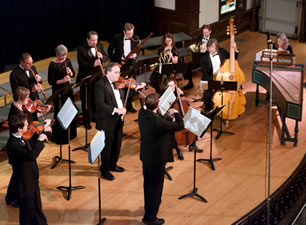The unseasonably cool weather had the HVAC system at the Carolina Theatre in Durham hopelessly confused as the nearly packed house was patiently waiting and freezing. Bob Nocek, President and CEO, came out on stage to put the crowd at ease that Esperanza Spalding was indeed here and would be out shortly. They were fortunate to have booked this remarkable young artist somewhere in the middle of the arc of her meteoric rise that included the 2011 Grammy Award for Best New Artist. This was an unprecedented achievement for a jazz musician, even more so for the fact that she beat out the likes of a manufactured teen heartthrob whose record sales contained numerous zeros and commas. So, you can bet that if Ms. Spalding returns to Durham in the future it will be at the new digs known as DPAC just blocks away from the funky, old, historical Carolina Theatre. In keeping with the tradition of jazz and rock acts being fashionably late, the music began about 30 minutes after the scheduled start time.
On stage was a large replica of a 1970s era boombox, and as the members of the horn section and the drummer, keyboard player and guitarist took their places on stage, the lights dimmed and we heard a simulation of the radio changing stations in a sort of mini-history of jazz, R&B, funk and hip-hop. Finally, the little wisp of a woman who has arguably become the most well-known bassist on the planet, strode out with an electric bass guitar to hoots and hollers. Although she has become almost as well known for her retro afro hairstyles, tonight her hair was down and greatly reduced in volume, giving her the appearance of being even smaller than usual. Spalding is a virtuosic triple threat: bassist, vocalist and composer who after first enrolling at the prestigious Berklee College of Music in Boston at the age of 16, upon graduation at age 20 became the youngest professor in the school’s history.
Despite Spalding being the named attraction, she arrived with a full 11 piece band, every member of that ensemble demonstrating their star status by virtue of their supreme musicianship. Like most recording artists on tour, the majority of their set list tends to be works from their latest CD and tonight was no exception. Spalding has three diverse and solid CDs on the Heads Up International label, but most of tonight’s show was songs from her latest, Radio Music Society, and most of those were written by Spalding.
Her songs ranged from “City of Roses,” an homage to her hometown Portland, Oregon to “Black Gold,” a racial pride song that she said was prompted by remembrance of the encouragement she received as child in Portland. This included a lovely vocal duet with backing vocalist Chris Turner. For me, the highlight of the evening was “Land of the Free,” an unabashed tribute to Cornelius Dupree who had served thirty years in prison for a wrongful conviction. Less successful was a series of “relationship” songs that were prefaced by a wooden-reading of a rather cheesy script that Esperanza recited with little conviction.
Spalding switched between a bass guitar and an upright acoustic bass, which was by far the more appealing sound of the two. Playing such an instrument, which towers over her in both height and girth, requires enormous physical exertion. It is no surprise that there are very few instances of a musician playing bass, at this virtuosic level, and singing at the same time. Spalding’s bass chops are the equal of anyone that I’ve heard and her vocal prowess displays an enormous range accompanied by beautiful phrasing and passion. The weak spot in her prodigious arsenal is that her songs can sometimes be meandering and lose interest for the listener, especially when there are a series of them back-to-back.
It was great to see and hear what was essentially a complete big-band horn section in a concert of this kind that tended more to the pop side of her repertoire rather than straight ahead jazz. These horns were cookin’ and tight. Some of the featured solos were from the “let me show you how fast I can play just for the sake of playing fast school,” but then you’d get trombonist Jeff Galindo blow a solo that was worth the price of admission.
The evening ended with an attempted audience sing-along that had a rather complex melody and rhythm, resulting in a desultory aural mess from the seats. Despite her best efforts, Esperanza was able to coax just a few brave souls to sing, and it seemed like she wished she hadn’t. She introduced the band members again while the musicians vamped as she exited the stage. The raucous audience reaction was the kind reserved for the shared experience of having just witnessed a star on its ascent. Where that ride takes Esperanza Spalding remains to be seen.











